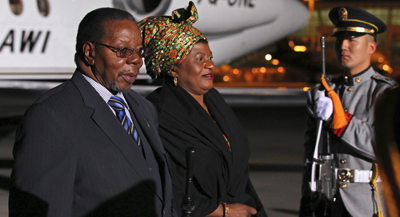In Malawi, where half the population survives on a dollar a day, it proves wise for the political elite to keep their exorbitant wealth hidden from public scrutiny. That’s why they appear to be running to the courthouse to file injunctions to silence the press.
“Our biggest concern is that in the pursuit of objectivity and balance in our investigations as reporters, we are now increasingly faced with ‘the elite’ who are dashing to court to legally stop the media from going public with their dirt,” Gabriel Kamlomo, editor of the private Zodiak Broadcasting Station, told me.
Nation Publication Limited, publishers of the independent The Nation, Weekend Nation and Nation on Sunday, has borne the brunt of this tactic. The publisher faces three injunctions blocking circulation of articles exposing tax fraud and unjustifiably large salaries of the countries’ public servants.
Later in March, the Secretary to the Treasury got an injunction blocking the Weekend Nation from revealing his salary package, according to local reports. Secretary Joseph Mwanamvheka earns a staggering MK4 million per month (US$ 26,000)–a salary far higher than his superiors, possibly even the president, local journalists told me. Again, the Nation Publishing Company hired a lawyer to appeal the injunction, but the courts told them to wait for a hearing of the parties involved.
Why would the ruling party, the Democratic Progressive Party, accept such misuse of public funds? The answer may lie in the close relations these politicians share with the ruling party and the president. The Secretary to the Treasury also happens to be the national chair of Mulhako wa Alhomwe, a quasi-political group that rallies behind the ruling party and the president’s ethnic group, according to local reports.
Some even have a closer association to the president. The first lady, Callista Mutharika, earns MK 12,480,000 (US$ 82,512) in her role as the Safe Motherhood and Early Childhood Goodwill Ambassador, a position originally considered voluntary work and held previously by the vice president, according to online reports. Reports released in February say the work contract also includes a car and driver, a 4 X 4, and fuel “paid for by the government.”
To be fair, the first lady did not seek an injunction to silence public exposure. But the state-run Malawi Broadcasting Corporation was quick to justify the salary and castigated other media outlets that ran the story, local journalists told me.
Few media houses will dare publish articles criticizing the ruling parties’ personal wealth these days after President Mutharika assented to an amendment to the penal code in January. The amendment allows the information minister to ban publications that the minister deems “against the public interest“. But how well does the government understand the public interest? In possibly the poorest country in Africa, the public may want to learn that their high-paid public officials commit tax fraud or that the first lady is chauffeur-driven, with fuel courtesy of citizens earning less than a dollar a day.
UPDATED: We substituted the original photo on this entry with one showing the president and first lady Callista Mutharika. The original photo showed the late first lady Ethel Mutharika. Thanks to reader Anthony Kasunda for pointing out the error.
